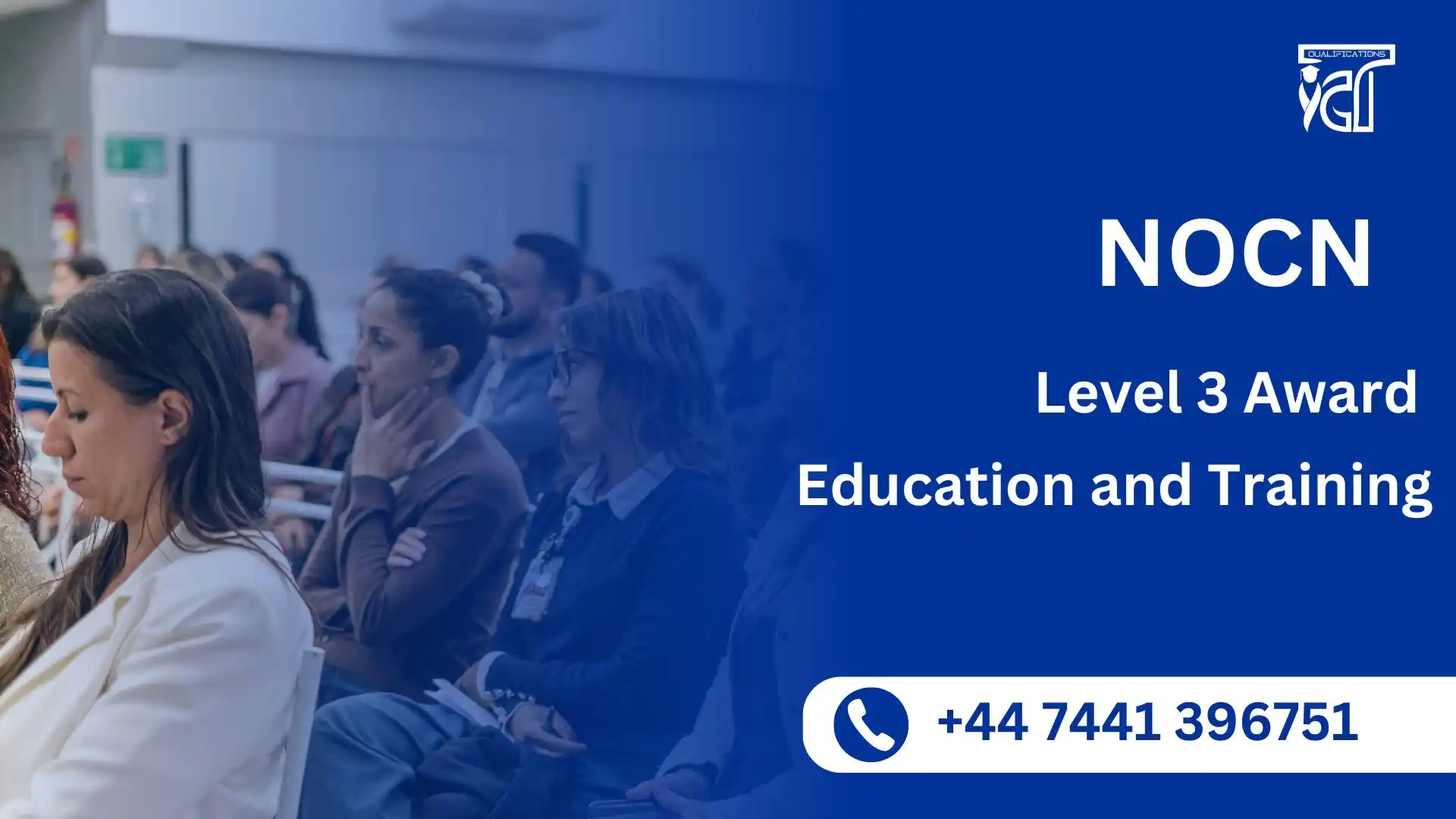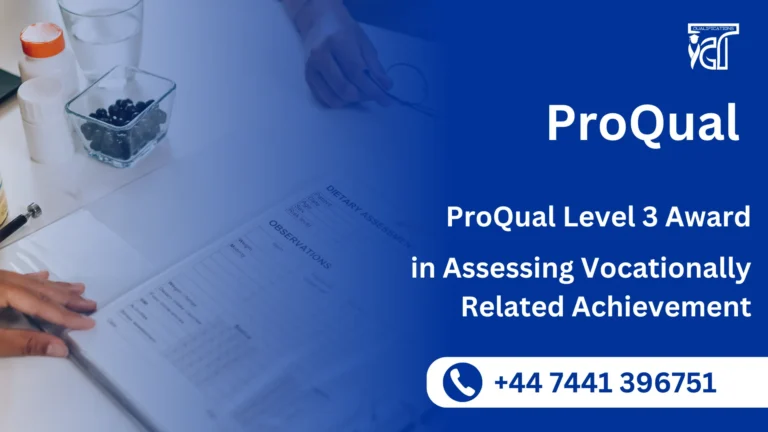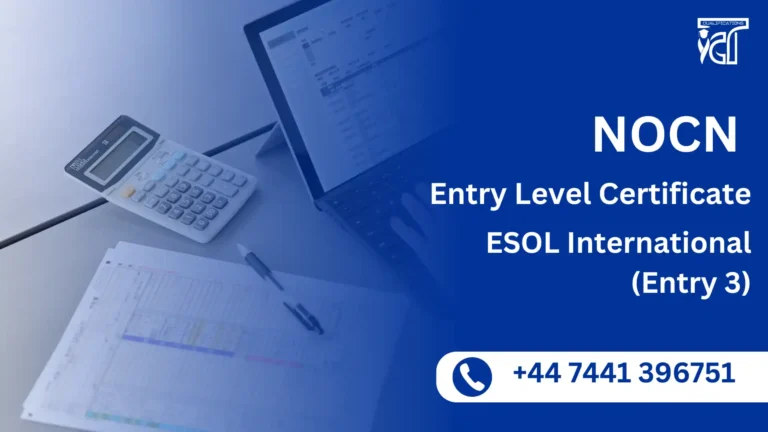If you’re looking to start or advance a career in education and training, the NOCN Level 3 Award in Education and Training is an ideal qualification to gain the skills and knowledge needed to teach effectively in a variety of learning environments. As an Ofqual-regulated qualification, this award is widely respected in the UK and provides a solid foundation for those entering or developing their career as a trainer, educator, or instructor.
The NOCN Level 3 Award in Education and Training is a nationally recognised qualification designed for individuals who wish to teach in further education, adult education, or workplace training. This qualification covers key areas of teaching, including planning, delivering, and assessing lessons, and helps you develop the skills needed to manage classrooms effectively.
Unlike many traditional qualifications that rely heavily on exams, the Level 3 Award is entirely assignment-based, allowing learners to showcase their knowledge and abilities through practical, real-world assignments. This flexible approach to assessment helps you gain the confidence and experience needed to succeed in a teaching role.
The NOCN Level 3 Award in Education and Training offers a practical and flexible pathway to becoming a qualified educator. With Ofqual regulation, assignment-based assessment, and a focus on real-world teaching skills, it provides an ideal foundation for anyone aspiring to teach or train in diverse educational settings.
NOCN Level 3 Award in Education and Training
The NOCN Level 3 Award in Education and Training qualification consists of Total Qualification Time (TQT): 120 and Credits : 12 for the completed qualification.
Mandatory units
| Sr# | Unit Title |
|---|---|
| 1 | Facilitate learning and development for individuals |
| 2 | Facilitate learning and development in groups |
| 3 | Understanding and using inclusive teaching and learning approaches in education and training |
| 4 | Understanding assessment in education and training |
| 5 | Understanding roles, responsibilities and relationships in education and training |
| 6 | Understanding the principles and practices of assessment |
GLH (Guided Learning Hours) and TQT (Total Qualification Time) are terms commonly used in vocational qualifications to help define the amount of time a learner is expected to spend on heir studies.
1. GLH (Guided Learning Hours)
GLH refers to the number of hours a learner spends being directly taught, supervised, or supported during their course. This includes the time spent in activities such as:
- Classroom instruction
- Practical workshops
- One-on-one tutoring or mentoring sessions
- Online learning sessions with tutor support
In other words, GLH represents the time that learners are actively engaged with their instructors or learning activities.
2. TQT (Total Qualification Time)
TQT represents the total amount of time a learner is expected to invest in completing a qualification, including:
- GLH (Guided Learning Hours): Time spent on direct learning, as explained above.
- Self-Directed Learning: This includes time spent on independent study, research, assignment completion, preparation for exams, and any other work the learner does outside of direct teaching hours.
TQT is a broader measure that includes all the time required to achieve the qualification. It helps learners and employers understand the overall commitment required for the qualification.
Key Differences Between GLH and TQT:
- GLH focuses on direct learning with guidance or supervision.
- TQT includes GLH as well as independent study time and other learning-related activities.
Example:
If a qualification has a TQT of 600 hours and a GLH of 250 hours, it means the learner should spend 250 hours in direct learning (classroom, online, or tutor-led sessions) and 350 hours on independent study or research.
Learning Outcomes of NOCN Level 3 Award in Education and Training
- Facilitate Learning and Development for Individuals
- Demonstrate the ability to plan and deliver individual-focused learning sessions.
- Understand the needs and preferences of individual learners to adapt teaching methods effectively.
- Apply strategies to motivate and engage individual learners, ensuring their development.
- Facilitate Learning and Development in Groups
- Develop the skills to plan and deliver group-based learning activities.
- Manage group dynamics to ensure a positive and productive learning environment.
- Utilize appropriate group teaching techniques to engage all learners effectively.
- Understanding and Using Inclusive Teaching and Learning Approaches
- Recognize the importance of inclusivity in teaching and learning practices.
- Adapt teaching strategies to meet the diverse needs of learners, ensuring accessibility.
- Implement approaches that promote equality, diversity, and inclusion within the learning environment.
- Understanding Assessment in Education and Training
- Understand the purpose and importance of assessment in the learning process.
- Learn different assessment methods and their application in the education setting.
- Gain the skills to provide constructive feedback that supports learner progression.
- Understanding Roles, Responsibilities, and Relationships in Education and Training
- Comprehend the roles and responsibilities of a teacher, trainer, and learner.
- Identify the professional boundaries and relationships within the education environment.
- Understand the importance of collaboration with other stakeholders in the learning process.
- Understanding the Principles and Practices of Assessment
- Understand the principles of assessment and their role in supporting learner development.
- Apply the practices of fair and valid assessment to ensure accurate evaluation.
- Learn how to maintain records of assessments and track learner progress effectively.
Course Benefits of the NOCN Level 3 Award in Education and Training are as :
Solid Foundation for Teaching
This qualification provides essential skills for individuals looking to start a career in education or training. It lays the groundwork for understanding teaching principles and best practices.
- Develop core teaching and training techniques.
- Gain an understanding of the role of a teacher.
- Learn how to manage a classroom effectively.
Career Advancement Opportunities
The NOCN Level 3 Award enhances your CV and increases your employability. It’s a recognized qualification that opens doors to various teaching and training roles.
- Boost your professional credentials and employability.
- Open career pathways in further education, vocational training, and adult learning.
- Enhance your teaching expertise to stand out in the job market.
Practical Teaching Skills
The course focuses on practical application, offering you the skills needed to deliver lessons confidently and effectively in a variety of settings.
- Gain hands-on experience with lesson planning and delivery.
- Learn to assess and support learners effectively.
- Build confidence in managing and engaging learners.
Understanding Learner Needs
Learn how to cater to different learning styles and meet the needs of diverse student populations, ensuring inclusivity in your teaching approach.
- Understand the importance of inclusive teaching.
- Adapt to diverse learner needs and learning styles.
- Foster a positive and supportive learning environment.
The NOCN Level 3 Award in Education and Training is designed for individuals who are passionate about teaching and want to develop the skills necessary to become effective educators. This qualification is ideal for those entering the education sector or those looking to formalize their existing experience in training or tutoring roles.
Aspiring Educators
- Individuals with little or no previous teaching experience who want to pursue a career in teaching or training.
- Those eager to work in further education, adult education, or vocational training settings.
- People seeking to gain a solid foundation in teaching methodologies and classroom management skills.
Current Trainers or Tutors
- Trainers or tutors who wish to enhance their qualifications and gain a formal teaching certification.
- Individuals who already have experience in delivering training but want to improve their skills through a structured, recognised qualification.
- Those looking to enhance their teaching effectiveness by learning best practices for planning, delivery, and assessment.
Professionals Seeking Career Transition
- Individuals looking to transition from another sector, such as business, healthcare, or public services, into education and training roles.
- Managers or workplace trainers wanting to gain formal qualifications to improve their teaching and development programs.
- Volunteers who want to formalise their teaching experience and skills to enhance their professional growth in education.
This qualification provides a comprehensive, flexible approach to becoming an effective educator, whether you’re starting your career or advancing in the field.
Entry Requirements
Register Now
Qualification Process
Qualification Process NOCN Level 3 Award in Education and Training
- Self-Assessment:
Begin by evaluating your eligibility to ensure you meet the qualification requirements, including work experience, knowledge, and language proficiency. - Registration:
Complete your registration by submitting the required documents, including a scanned copy of a valid ID, and paying the registration fee. - Induction:
An assessor will conduct an induction to confirm your eligibility for the course and explain the evidence requirements. If you do not meet the criteria, your registration will be canceled, and the fee will be refunded. - Assignments & Evidence Submission:
Provide all assignments and the necessary evidence based on the assessment criteria outlined in the course. If you are unsure of the required evidence, consult with the assessor for guidance on the type and nature of evidence needed. - Feedback and Revision:
The assessor will review your submitted evidence and provide feedback. Evidence that meets the criteria will be marked as “Criteria Met,” while any gaps will be identified. You will be asked to revise and resubmit if needed. - Competence Evidence:
Submit final evidence demonstrating that all learning outcomes have been met. This evidence will be marked as “Criteria Met” by the assessor once it is satisfactory. - Internal Quality Assurance (IQA):
The Internal Quality Assurance Verifier (IQA) will review your evidence to ensure consistency, quality, and compliance with standards. - External Verification:
The IQA will submit your portfolio to NOCN External Quality Assurance Versifier (EQA) for final confirmation. The EQA may contact you directly to verify the authenticity of your evidence. - Certification:
Upon successful completion of all checks, NOCN will issue your official certificate, confirming that you have attained the NOCN Level 3 Award in Education and Training







